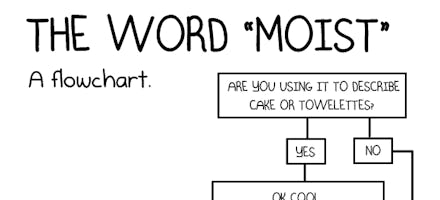"Moist" Makes Us Cringe — Here's the Actual Science Behind Our Hate

Moist.
Just the sound of the word sends shudders down many people's backs. There are Facebook groups, countless Internet lists and even television jokes, from Jimmy Fallon's "thank-you notes" skit to How I Met Your Mother, dedicated to hating the word.
Inevitably, scientists have caught wind. Everyone from linguists to psychologists have dug deep into why "moist" disgusts so many people and why it seems like the most widespread word hate of all. Is it the "oi" sound? The shape your face makes when you say it? The sexual connotation?
It's that we've come to think of it as disgusting — and disgust is contagious.
The science behind "word aversion": There are certain prompts that trigger disgust. Disgust is a "revulsion response" in the brain, one that psychology professor Paul Rozin describes as ideational, not just literal — meaning we can be disgusted by a word because of what it represents, even though the string of letters holds no significance.
Thus over time, we experience "word aversion," as words themselves trigger disgust just as much as — and independent of — the things they describe. As University of Pennsylvania linguistics professor Mark Liberman put it on the blog Language Log, "the word itself somehow feels unpleasant or even disgusting."
As Nautilus recently noted, we're even more disgusted when there's a "contrast effect." A recent study by Oberlin College psychologist Paul Thibodeau measured people's reactions to "moist" paired with various other words. Participants had the strongest reaction when "moist" was paired with sexual words ("fuck") or unrelated words ("paradise"), whereas "moist" was deemed less aversive when paired with an expected word, like "cake."
The question remains, however: Why are so many of us averse to the same exact word, when there are so many disgusting ones in the dictionary? It's because disgust is basically contagious.
"Word aversion" is contagious: "Disgust is what is called a social contagion," Jason Riggle, a Professor of Linguistics at University of Chicago, told Mic. "If you drink too much tequila, the thought of tequila will make you sick. But you can also observe someone else getting sick from something and develop a similar disgust response. Disgust is contagious in that way."
It's a protective measure we take as humans, Rozin told Penn Arts and Sciences Magazine in a interview. "Disgust evolves culturally," he said, "and develops from a system to protect the body from harm to a system to protect the soul from harm."
So we take disgust cues from each other. As Riggle put it to Mic, "Once someone tells you their disgust, that can stick in your mind as the one reference for it."
Today, pop culture and social media help spread the revulsion, Terry Pettijohn, professor of psychology at Coastal Carolina University, told Mic. "People see ... Jimmy Fallon doing segments on the word on the Tonight Show and are influenced to jump on the bandwagon and share the word aversion."
The bandwagon affect isn't quite the same as "trendy" hatred for Gwyneth Paltrow, Nickelback or Anne Hathaway. It's stronger — when you find yourself suddenly cringing at the word "moist" for the first time, it might just be your human instincts kicking in.